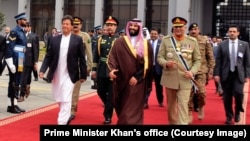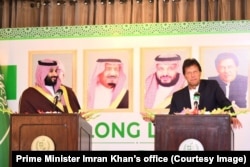Saudi Crown Prince Mohammed bin Salman has concluded a landmark two-day visit to Pakistan where he oversaw the signing of unprecedented investment deals worth $20 billion and ordered the release of more than 2,000 Pakistanis from Saudi prisons.
Pakistani President Arif Alvi bestowed the country's highest civilian honor on the Saudi crown prince, also known as MBS, at the end of official meetings.
"What we did in Pakistan is just the beginning," MBS said in a nationally televised remarks before boarding the aircraft to leave Pakistan.
Bin Salman is on his first tour of South Asian nations and China since becoming the Saudi leader in 2017. The crown prince arrived in Islamabad Sunday evening where Pakistani Prime Minister Imran Khan and senior civil and military leaders received him at an Air Force base. The Saudi leader was accompanied by a large delegation of ministers, members of the royal family and businessmen.
Khan personally drove MBS to the palatial prime minister's complex in the capital where the two leaders held formal talks and oversaw the signing of seven major agreements between their two delegations.
Speaking at the end of the late night ceremony, bin Salman noted his delegation signed "$20 billion" worth of memorandum of understandings.
"It's big for phase one and definitely it's going to grow every month, every year in bigger numbers and will be beneficial for both countries," he said.
The agreements signed Sunday included a deal for a $10 billion oil refinery in Gwadar, where China has built and activated a major seaport.
Pakistani officials say the facility will be in place in next "3-5 years" in Gwadar and will meet the country's needs of refined oil products currently being imported. The surplus will be exported to regional countries.
The unprecedented Saudi investment is being viewed by Prime Minister Khan's nascent government as a major boost for Pakistan, which is facing an economic crisis and balance of payments pressure.
Khan welcomed Saudi investment in areas of oil refining, petrochemicals, energy and other sectors.
"We have CPEC (China-Pakistan Economic Corridor), we have links with China. We have very close connectivity with probably what is the biggest market in the world, which is China. So we welcome Saudi Arabia to participate with us. It's an exciting future," the Pakistani prime minister said.
CPEC is a package of infrastructure, energy and port-building projects Beijing is funding in Pakistan as part of its global Road and Belt Initiative. China has already invested $19 billion over the past five years and plans to invest billions more to construct industrial zones.
During the nationally televised conversation with MBS, Khan asked him to look into the plight of Pakistani prisoners in Saudi jails and ensure better treatment for nearly 2.5 million Pakistanis working in Saudi Arabia. There are about 3,000 Pakistanis, mostly laborers, languishing in Saudi prisons and facing charges ranging mainly from illegal entry and visa violations.
MBS promised to look into both the issues and told Khan: "Consider me ambassador of Pakistan in Saudi Arabia. His delegation informed Pakistani negotiators Monday morning that more than 2,100 prisoners are being released from Saudi jails.
The Saudi Kingdom hosts more than 2.5 million Pakistani expatriates in all, and is a key source of oil supplies for Islamabad. It allows Pakistan to make deferred payments, and offers cash grants to help Pakistan's often ailing economy.
Prime Minister Khan was one of the few international leaders who participated in an investment conference that Saudi Arabia hosted in October. The event was organized just days after the killing of Jamal Khashoggi, a Washington Post columnist, at the Saudi Consulate in Istanbul. Many foreign participants boycotted the conference to protest Khashoggi's killing.





